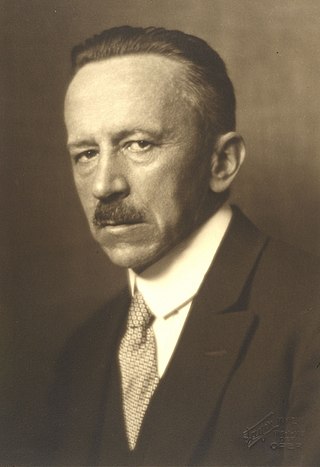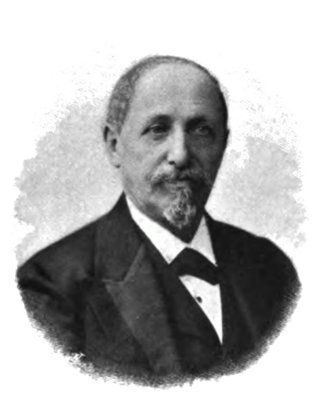
August von Hayek was an Austrian physician and botanist born in Vienna. He was the son of naturalist Gustav von Hayek and the father of economist Friedrich Hayek (1899–1992).

Moritz Allé (1837–1913) was an Austrian astronomer and mathematician, one of the teachers of Nikola Tesla.

Friedrich Siebenrock was an Austrian herpetologist.

Josef Löwy was an Austrian painter, publisher, industrialist and Imperial and Royal court photographer.
Josefine Swoboda was an Austrian portrait painter. She was one of the most active Vienna portraitists.

Bertha von Tarnóczy-Sprinzenberg was an Austrian art teacher and painter, specializing in landscapes and still lifes.
Marie Hoheisel was an Austrian women's rights activist.

Auguste Groner, was an Austrian writer internationally notable for detective fiction. She also published under the pseudonyms Olaf Björnson, A. of the Paura, Renorga, and Metis.

Marie Lang was an Austrian feminist, theosophist and publisher. Born in 1858 in Vienna, Lang was raised in a liberal, upper-middle-class home. After divorcing her first husband in 1884, she married Edmund Lang and the two hosted an influential salon for politicians and intellectuals. Joining the women's movement toward the end of the 1880s, she quickly became an influential women's rights activist. In 1893, along with Auguste Fickert and Rosa Mayreder, she founded the Allgemeiner Österreichischer Frauenverein. In spite of provisions in Section 30 of the law governing associations, which prohibited women's political involvement, the three friends used their networks of influential politicians and intellectuals to press for legal changes in laws governing women and children's civil rights and in favor of women's suffrage. In 1898, she co-founded the women's journal Dokumente der Frauen, serving as its editor-in-chief until 1902.
Ilse Erika Korotin is an Austrian philosopher and sociologist. She researched and published on the history of ideas of Nazism. At the Institute for Science and Art in Vienna, she heads the Documentation Centre for Women's Studies. Her work focuses on feminist biographical research and history of science.
Ottilie Bondy, née Jeitteles was an Austrian women's rights activist and women's association official.
Marianne Schmidl was the first woman to graduate with a doctorate in ethnology from the University of Vienna. An Austrian ethnologist, teacher, librarian and art collector, Schmidl was plundered and murdered in the Holocaust by the Nazis because of her Jewish origins.
Sibylle von Bolla-Kotek was an Austrian scholar of legal history and the first female professor in a legal faculty in Austria.

Sidonie Josepha Grünwald-Zerkowitz was an Austro-Hungarian writer, poet, translator, educator, and fashion designer.

Amalie Haehnel, also Amalie Hähnel, was an Austrian operatic singer and vocal teacher.

Irma Troll-Borostyáni was an Austrian writer, journalist and campaigner for women's rights.
Leonie Adele Spitzer was an Austrian writer, poet, and educator.
Max Büdinger was a German historian. He was a professor of general history at the University of Vienna (1872–99).
Karoline Bruch-Sinn was an author, translator, and editor from Austria-Hungary. She published under the pseudonym Adele von Drachenfels, as well as the names Carola, Saldau, and Sphinx.

Margarethe Jodl, also Margarete, née Förster (1859–1937) was a German translator and writer who is remembered for supporting the women's movement in Austria. In November 1900, together with Yella Hertzka and three others, she founded and chaired the Viennese Women's Club. The organization was however not very successful and in 1903 gave way to the Neue Frauenklub. Married to the German philosopher Friedrich Jodl, she supported his educational ambitions until his death in 1914. Thereafter she was active in the Viennese adult education initiative Wiener Volksbildungsverein.










